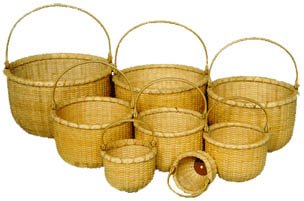
Wait, can we actually say that? Are you sure you would be able to pick an object out of each of the buckets?
Well, of course you could. It's easy to just reach in and grab an object when the bucket contains a set of discrete physical objects. But an important question to ask is this:
Which object do you grab?
You would probably grab one "at random", without thinking about it. Actually, you are intuitively following a crude selection procedure that probably looks like this:
- Reach hand into center of bucket and grab the first object you hit.
- If your hand doesn't hit any objects, move it around in larger and larger circles, and you will hit one before you reach the walls of the bucket.
Which element do you choose?
Suppose you have a hundred sets, each containing at least one element. Could you choose an element from each? It seems simple enough. If they were all finite sets of integers, for example, you could simply go and choose the element with the lowest value from each set.
But what if one of the sets contained all the real numbers greater than 0 and less than 1? This set would not have a lowest real number. OK, no biggie, for sets like that you can always just take the average of the two boundaries (in this case, 1/2).
But then what if one of the sets just contained the three colors red, green and blue? Obviously you need a separate type of selection procedure for that one, such as "always pick green".

If each of the hundred sets were completely different, you might just resort to going through them all, one by one, and writing notes to yourself: "pick this here, pick that there". And this would still constitute a valid selection procedure. So far, your intuition would be right about being able to choose an element from each set...
...But what if there were an infinite number of sets? This time you can't just write an infinite number of notes to yourself, because you can't have an infinitely long selection procedure. So are you sure you could decide which element to pick out of each one?
The axiom of choice simply states that this is possible for any infinite set of sets. But it turns out that the axiom of choice is independent of the other axioms of set theory! The other axioms of standard set theory can neither prove nor contradict it. This is a stunning result. As mathematicians tried to wrap their heads around this mind-blowing axiom, they ended up with all kinds of profound results. For example, it is logically equivalent to some unexpected statements in set theory.
You can use the Wikipedia article about Axiom of choice as a starting point to explore. Let me know your thoughts.
No comments:
Post a Comment